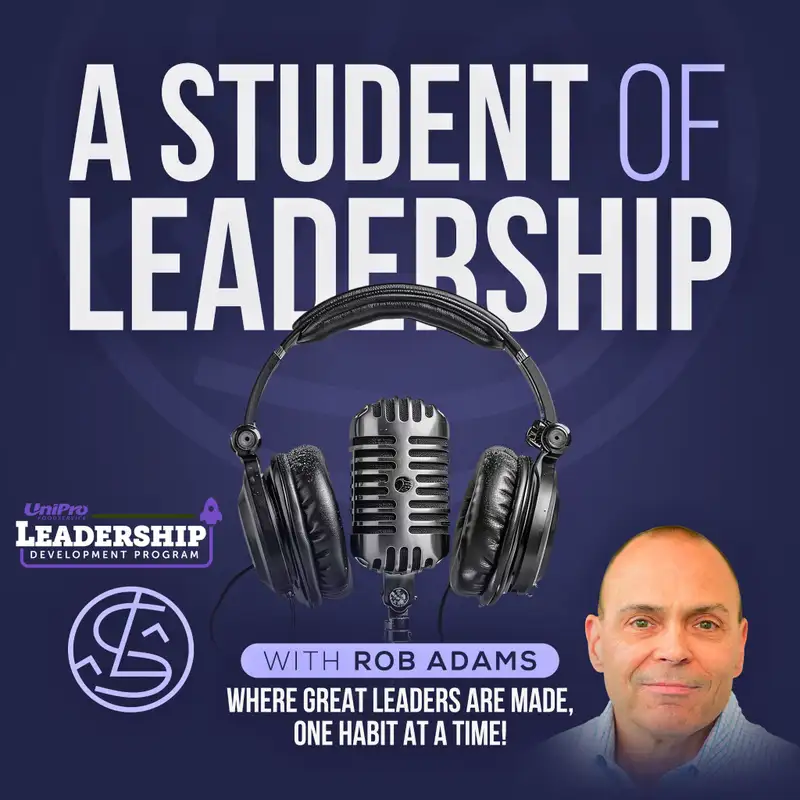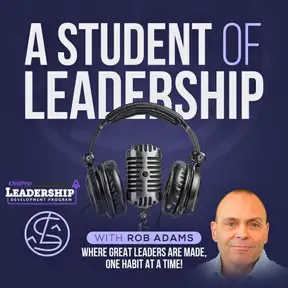Episode 1 - My Leadership Journey
Download MP3It was the summer of 1993 and the hallways of our divisional office were buzzing with the usual pre-sales meeting energy. As an outside sales representative for a wholesale distributor on the East Coast, I was in my sixth year walking into the office that morning with my sales reports tucked under my arm, feeling satisfied with my recent numbers. I was thinking about the next big account opportunity and how I'd pitch them.
Little did I know my whole perspective on leadership was about to change. That's when everything changed. Our CEO approached me in the hallway, wearing a thoughtful look that was different from his usual quick hallway greeting. When he asked if I had a few minutes to talk about an opportunity, I noticed he was carrying a folder with my name on it. That's when I knew this wasn't going to be our typical casual conversation.
As I followed him into his office, my mind raced through every sales call, every customer interaction, wondering what this was about. Was this about that big account I just landed, or had I missed something crucial? Hello everyone, I'm Rob Adams, and I'm your host, guide, and most importantly, a fellow student of leadership. If you're here, I'm guessing you share my passion for learning and my deep curiosity
about developing leadership and coaching skills. As we begin 2025, I invite you to join me on this journey of discovery and growth. You see, that hallway conversation back in 1993 launched me into leadership, though I didn't truly understand what that meant at the time. Like many of us, I thought leadership came with the title.
I became a district sales manager and I emphasize manager and that's exactly what I did. I managed. Let me be honest, I micro-managed. I insisted on being copied on every customer email, every single one. I even created a complex spreadsheet tracking system that required my team to log every customer interaction with detailed notes, not for their benefit.
but so I could monitor their every move. I thought I was being thorough. In reality, I was suffocating their initiative and creativity. Looking back now, I can see it clearly. I was operating with a dangerous combination of limited self-awareness and more than that, a little arrogance. I remember one sales meeting where a team member suggested a different approach to targeting new accounts.
Instead of listening, I immediately shot down their idea, citing my years of experience. This is how we've always done it and it works, I declared. Looking back, I cringe at how many good ideas I might have missed with that attitude. My poor sales team at the time, they became unwitting participants in my own on the job leadership laboratory. One day I was their peer.
and the next day their manager, and I absolutely had no idea how to make that transition effectively. I pushed, I pulled, I demanded, all while focusing intensely on metrics and numbers, not realizing that the path to those numbers ran straight through the hearts and minds of my team. Now don't get me wrong, I wasn't coming from a place of selfishness.
Even in those early days, I celebrated when anyone on the team landed a big account. I'd make sure everyone knew about it, sending out congratulatory emails, and I used all their success stories in our team meetings. My heart was in the right place. I just hadn't learned how to channel that team spirit into effective leadership.
Does this story sound familiar? Have you experienced that challenging transition from individual contributor to leader? If so, we already have something in common. Let's take a closer look at these roles and what they really mean. A manager conducts and directs. A leader influences and inspires. A coach trains, tutors, and develops.
These aren't just dictionary definitions. They represent fundamentally different approaches to working with people. My journey continued through various roles, regional sales manager, director of sales, and several vice president positions on both coasts. But the real transformation didn't begin until I encountered leaders who invested in my development. One leader in particular, my CEO in Northern Virginia Division,
a way of delivering feedback that finally got through to me. He never criticized. Instead, he would ask questions that made me think deeply about my approach. What do think your team would say about that decision? He'd ask. Or how else might you approach this? But it was one question that really stopped me in my tracks. Rob, if you were on your team, would you want you as the leader?
He was teaching me the art of coaching through his own example. And the real turning point came for me in 2009, and I'll be honest, it wasn't comfortable. The feedback that finally broke through my defenses was simple but profound. Rob, my leader, said, you're so focused on proving you're the smartest person in the room that you're missing the chance to make everyone else in the room smarter.
that really hit home because it captured both the problem and the opportunity in my leadership style.
But here's the question that changed everything. Who was I developing along the way? The truth? No one. I didn't know how.
The real transformation began during my time in Southern California where I went through an intensive executive leadership development program. It started with a comprehensive 360 degree feedback process. And the most surprising feedback was that while my team respected my work ethic and industry knowledge, they felt I was more invested in being right than in helping them grow. One comment particularly struck me.
Rob knows how to drive results, but we wish he would invest as much energy in developing us as he does in hitting the numbers. You see, learning to ask questions instead of giving immediate solutions was one of the hardest behaviors for me to master. I had to literally sit on my hands sometimes to stop myself from jumping in with answers. I started keeping a tally of questions versus directions in my meetings.
Slowly, over months of my conscious effort, I retrained myself to lead through inquiry rather than instruction.
And here's a striking reality around all organizations worldwide. They have spent over $366 billion annually on leadership development. Yet nearly 75 % of those companies lack confidence in their leaders' ability to drive their organizations forward. Why is that? Because we've been approaching leadership development all wrong.
Think about your own experiences. How many leadership workshops have you attended? How many books have you read? And more importantly, how many of those insights created lasting changes in how you lead today? The truth is, one-off learning experiences rarely create sustained behavior change. Real leadership development isn't an event. It's a journey.
It's about consistent practice, reflection, and refinement over time. This is particularly crucial today as organizations invest heavily in technology and artificial intelligence. While these investments are important, they often come at the expense of developing our human capital, our leaders, and our people. In these episodes ahead, we'll break down leadership into its essential elements
examining one powerful word or phrase at a time. We'll start at the foundation, defining leadership itself. What does it truly mean to lead? Not just from a theoretical perspective, but in the real world where decisions have real consequences and people's lives are impacted by our actions. From there, we'll explore the core elements that shape extraordinary leaders.
We'll dive deep into vision, how leaders create and communicate a compelling picture of the future that inspires others to follow. We'll examine integrity, the bedrock of trust and credibility without which no leader can truly succeed. We'll explore empathy, the ability to understand and share the feelings of others, which transforms managing into true leadership and will tackle accountability, both
ourselves and others responsible for results while creating an environment where people can grow and thrive. These aren't just leadership buzzwords. Each word represents a gateway for understanding the behaviors and mindsets that separate effective leaders from those who merely hold leadership titles. In each episode, we'll take a deep dive into one of these critical concepts.
exploring its real meaning through stories, examples, and practical applications that you can put to work immediately in your own leadership journey. I encourage you to treat each episode as a building block in your leadership development. Take notes, reflect on the concepts, and most importantly, consider how each word or phrase we explore shows up or could show up in your own leadership practice.
Share your insights and experiences with our community because some of our best learning will come from each other. Think of this as your leadership masterclass where each concept builds upon the last, creating a comprehensive framework for your growth as a leader. Whether you're just starting your leadership journey or you're a seasoned executive looking to refine your approach,
These fundamental elements of leadership will help you create deeper impact with your teams and in your organizations.
My mission now is to help others avoid the long, sometimes painful journey I took to understand true leadership. There's a better way, and together we will discover it. As a perpetual student of leadership myself, I remain passionately committed to both my own growth and investing in others. The journey never ends. We simply pause occasionally to measure our progress
not just through self-reflection, but through the eyes of those we interact with each and every day. So I invite you to join me on this journey. Together we'll explore the principles, practices, and behaviors that transform good managers into extraordinary leaders. Because leadership isn't just about what we achieve, it's about who we become and who we help others become along the way.
In our next episode of a Student of Leadership podcast, we'll tackle our very first keyword, leadership itself, and explore why its true meaning might surprise you. You won't want to miss it. Let's begin this journey together. Take care, everybody.
Creators and Guests


